Are you a serious home inspector ready to expand your business and find a niche in the home inspection industry? Many home inspectors struggle to remain current in an industry that requires constant growth, but becoming a Certified Professional Home Energy Auditor is a great way to stand out and raise the value of your business.
As a home inspector, you already know about the rising demand for energy-efficient homes. Today’s buyers aren’t only seeking homes that are beautiful; they’re also worried about making long-term energy savings and lowering their carbon footprint. Entering the field of home energy audits can be tricky without the right education and certification, though.
If you’ve been wondering how to get your energy audit certification, we’ll walk you through the steps you need to take. We’ll clarify the common misconceptions surrounding the license requirements, offer you practical guidance on how to get going, and present a list of resources to help you along the way. Once you read this guide, you’ll be prepared to provide a meaningful service to your clients, boost your earning potential, and help create a greener future.
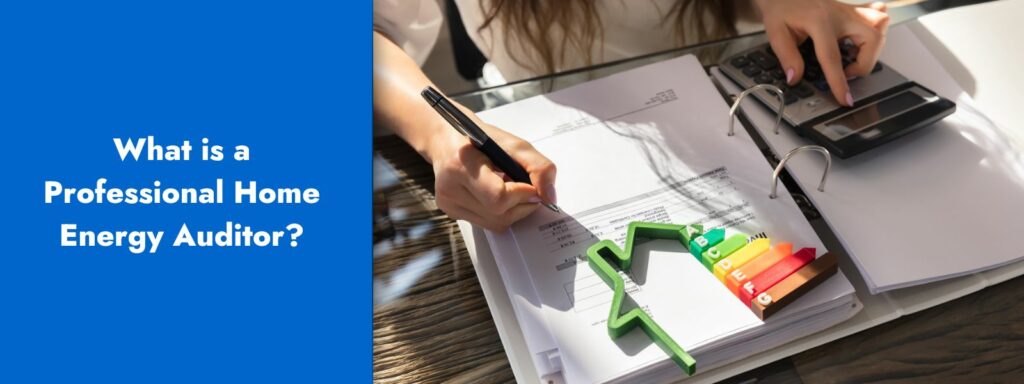
What is a professional home energy auditor?
As a home energy auditor, your main goal is to help homeowners make educated decisions about energy improvements. These changes may result in significant energy savings, lower utility costs, and higher property values. As a result, homeowners support a more environmentally conscious and sustainable way of living by consuming less energy.
Energy auditors use a variety of specialized tools and skills to carry out these energy audits. They evaluate the appliances, doors, windows, and HVAC, or ventilation systems of a house. Energy inefficiencies are found using advanced tools including thermal imaging cameras, blower door tests, and information loggers. Auditors have a thorough understanding of building technology and use data analysis to find locations where energy is being wasted. They then give homeowners a thorough inspection report and recommendations for improvements.
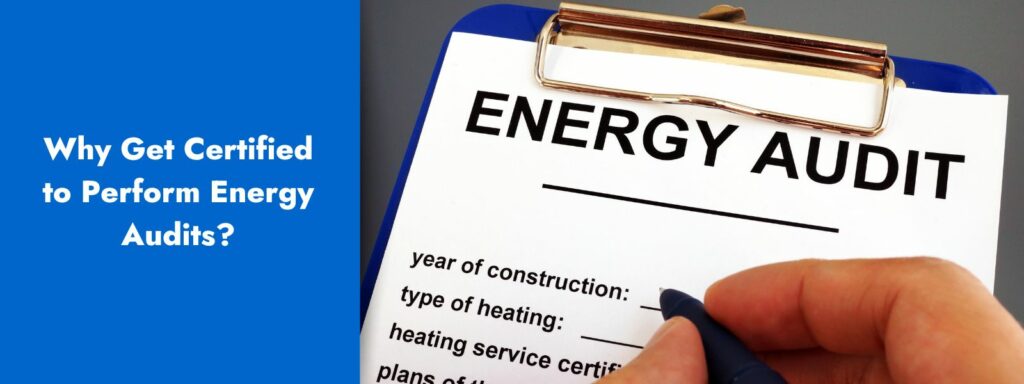
Why get certified to perform energy audits?
While you’re working as a home inspector, it’s a wise career move with many benefits. First of all, it expands your services, improves your skill set, and increases your worth to clients. Homeowners are actively looking for energy-efficient properties, and your ability to conduct energy audits places you as a leader in the field.
Certification can also increase your potential income. Homeowners are being urged to participate in energy-efficient upgrades by numerous government incentives and rebate programs, which may increase demand for your services.
Although certification has some upfront fees, it has a high return on investment (ROI). Energy audits not only give you the opportunity to increase your fees but also give you a competitive edge in the industry. Customers who are happy with your work are more likely to spread the word about you and use your services again, which will boost your bottom line.
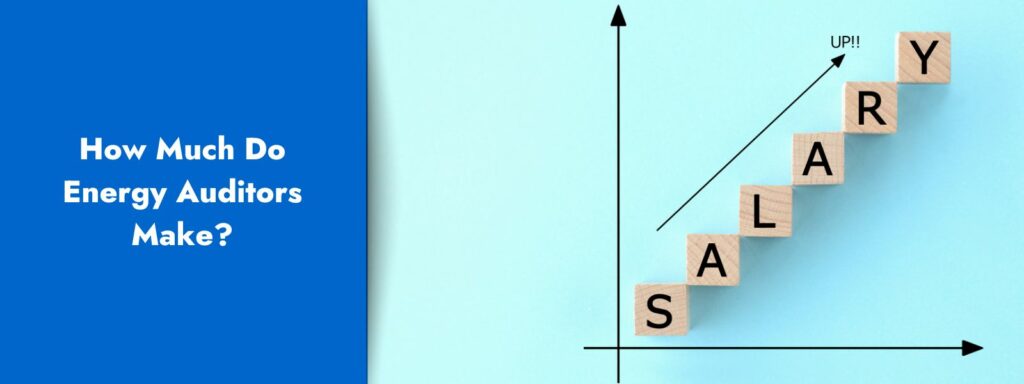
How much do energy auditors make?
Your income potential as a home inspector with a specialization in energy audits can differ depending on a number of things, including your region, your level of expertise, and the need for energy-efficient homes. Your income may be low when you first start out, often falling between $35,000 and $50,000 annually. Inspectors at the entry-level frequently work for well-known companies or governmental organizations and are paid an hourly wage or a base salary.
Your earning potential, however, can considerably improve as you advance in the profession and establish a solid reputation. According to Glassdoor, with a few years of experience, your annual home inspector salary may range from $57,000 to $96,000. This is because you have the power to charge more for your knowledge and have access to more profitable freelance alternatives.
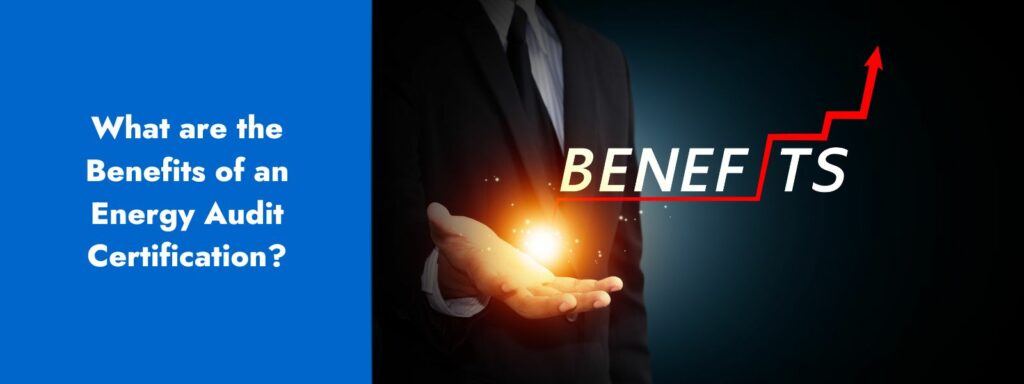
What are the benefits of an energy audit certification?
When you add an energy audit certification to your home inspection skills, there are many benefits. Let’s take a look at some of the best reasons to pursue additional education.
1. Good pay
One of the many advantages of getting an energy audit certification is the opportunity for high pay. Energy audit services can improve your job prospects and income possibilities, whether you work privately or for an inspection company. Home energy audits are becoming more and more popular as homeowners look for methods to save energy and money on their utility bills. With an energy audit certification, you add a worthwhile service to your existing home inspection business that yields higher prices and provides a consistent cash stream.
2. Plenty of work / Job Security
The rising focus on energy efficiency is predicted to boost the demand for home energy audits in the future. The demand for energy-efficient homes will also increase as more people become environmentally aware and look for solutions to lessen their carbon footprint. This means that certified energy auditors will have no trouble finding employment. Your skills will become indispensable in a world that strives for greater energy efficiency as homeowners and companies will seek your knowledge.
If that’s not convincing enough consider this, more than half of the more than 66 million single-family homes in the U.S. were constructed before modern energy codes existed. The Department of Energy (DOE) and EPA have stated a goal of eventually improving 1 million homes per year through weatherization and home energy improvements.
3. Potential for Growth
A wide variety of professional opportunities can open up with an energy audit certification. As technology advances, new career opportunities in the field of energy audits are likely to develop. Modern energy-efficient solutions like smart home technology, renewable energy sources, or green building design could be your area of specialization. Also, as laws and regulations change, there may be a demand for certified energy auditors across a range of industries, including government, real estate, and construction. Your qualification might act as a springboard for further developing your career.
Additionally, you’ll have a certification that differentiates you from your competition. Use your energy audit certification in your inspector marketing strategy. Take advantage of social media marketing on different platforms to highlight your credentials and attract prospective clients. You can also leverage the time spent in classrooms during the certification process to practice and hone your home inspector networking techniques.
4. Job with a purpose
An opportunity to help create an environmentally friendly future exists when you work as a home inspector with energy audit credentials. By identifying and correcting energy inefficiencies, energy auditors play a key part in conserving the environment. Conducting energy audits enables you to contribute to lowering greenhouse gas emissions, resource conservation, and energy usage. As a result, the comfort level of households and companies is increased, energy expenses are lowered, and the standard of living is improved.
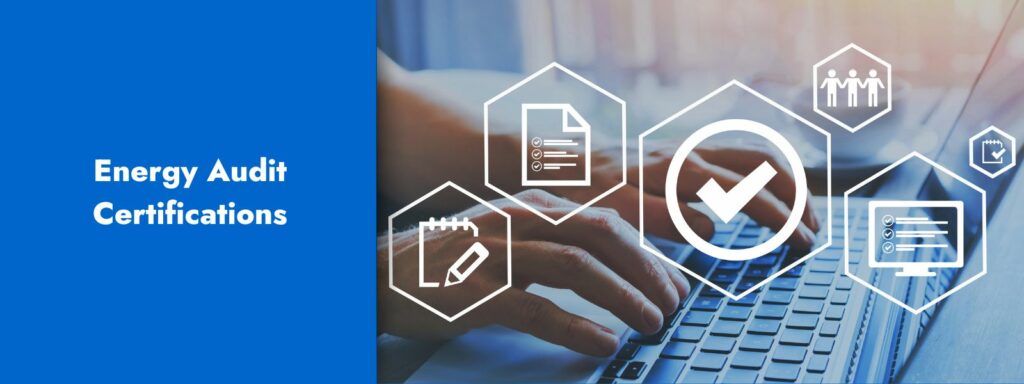
Energy Audit Certifications
Now that you know about the many good reasons to obtain energy audit certification education, it’s time to take a look at the many ways you can go about it. By using these reputable organizations, you’ll take your home inspection business to the next level. Two organizations not listed below but worth checking out are the Home Energy Professional Association (HEPA) and the Sustainability Education Academy. Take a look at the most common ways to get your certification and the things you’ll need to know about each program. Look at the eligibility criteria, exam format, and course requirements to determine which program is right for you.
Building Performance Institute (BPI)
Building Performance Institute (BPI) is a trusted organization in the fields of sustainability and energy efficiency. By establishing industry standards, providing certifications, and advocating best practices in energy efficiency and home performance, BPI’s goal is to promote the building performance industry. One of the most sought-after of their many certificates, the Energy Auditor Certification, shows your competence in evaluating and improving the energy efficiency of home and business facilities.
- Certification Requirements / Prerequisites: In order to become a BPI Certified Energy Auditor, you’ll need to fulfill a number of requirements that may include having at least 1,000 hours in a similar field. You’ll also need at least 10 energy modeling courses under your belt, and experience in the building industry.
- Classes (Hours): To obtain the energy auditor certification, BPI normally requires candidates to pass specific training programs. Depending on the source of training and your prior experience, different numbers of hours may be needed for them. Fundamentals of building science, energy modeling, the use of diagnostic tools, and building envelope inspections are among the subjects that are often addressed in training sessions.
- How to Prepare for Certification: When you’re preparing for BPI’s energy audit certification, you must enroll in BPI-approved classes provided by certified instructors. These classes give you the knowledge and hands-on experience you’ll need to ace the exam. You can also further improve your understanding by studying the official BPI study guides and taking practice examinations.
- BPI’s Exam: The Energy Auditor Certification exam administered by BPI typically consists of a written and a field exam. The written exam includes multiple-choice questions, and the field exam assesses candidates’ ability to perform energy audits on actual buildings. For the written exam, you can expect to be given two hours to answer 100 multiple-choice questions, and you must answer at least 70% of them correctly to get your certification. For the field exam, you will have four hours to score at least 82%.
- Continuing Education Requirements: Once you’ve passed your BPI Certified Energy Auditor course, you’ll need to acquire at least 24 hours of continuing education (CE) credit to be eligible for renewal.
- Certification Renewal (Cost & Frequency): Certification renewal is essential to maintain active BPI certification. Renewal occurs every three years, and the renewal costs can also vary, so candidates should refer to BPI’s official website or contact them directly for the most up-to-date renewal information.
- Cost of Certification: The cost of obtaining the Energy Auditor Certification from BPI varies by testing location. In order to find out the most relevant pricing for your area, you should contact the test administrators in your area.
Association of Energy Engineers (AEE)
The Association of Energy Engineers (AEE) is another established organization that promotes energy efficiency and environmentally friendly practices. AEE offers a certification program for energy auditors, Certified Energy Auditor (CEA), as one of its numerous services. This well-respected certification in energy management is made to serve as proof of the skills and knowledge of experts in energy evaluation and maintenance.
- Certification Requirements/Prerequisites: As you’re becoming a certified energy auditor, AEE candidates need to meet several prerequisites. Since their last update in September 2021, the prerequisites generally included having a minimum of three years of verifiable experience in energy-related work. However, your work experience as a home inspector will suffice.
- Classes (Hours): AEE offers online training courses that will see you taking at least 27 hours of class credits. Since the courses are delivered electronically, completing the course outline may take up to six months.
- How to Prepare for Certification: AEE’s training courses are specifically designed to cover the key topics and knowledge areas required to pass certification. In addition to certified instructors, you can benefit from AEE’s multitude of materials for studying.
- Exam (Questions/Time Limit/Minimum Score): The CEA certification exam is performed at predetermined testing locations. It’s a multiple-choice exam that consists of 100 questions with two hours to complete. In order to pass, you must score higher than 70%.
- Certification Renewal (Cost & Frequency): Your CEA certification will need to be renewed every three years. Currently, the renewal fee for your recertification is $300. If you choose to become an AEE member, your price may be lower.
- Cost of Certification: Before taking your energy auditor certification exam, you will need to pay a $500, non-refundable fee. If you fail the test the first time, don’t worry! It’s $250 to retest another time.
Residential Energy Services Network (RESNET)
A nonprofit organization called the Residential Energy Services Network (RESNET) is focused on advancing energy efficiency in the housing sector. The energy auditor certification offered by RESNET is extensive. The RESNET Home Energy Auditor (HEA) Certification is intended for specialists, like home inspectors, in residential energy audits. The specific requirements of this certification include:
- Certification Requirements/Prerequisites: RESNET’s Home Energy Auditor Certification can vary, but you should have a background in home and building inspections, or a related field. Your work experience, education, and additional certifications may also be counted as the proper prerequisites. Check out RESNETS Home Energy Audit Program Guidelines for more info.
- Classes (Hours): RESNET’s training courses can help you prepare for the Home Energy Auditor Certification. Covering a wide range of topics related to building energy efficiency, you can expect to spend between 27-30 hours with RESNET’s course design.
- Exam (Questions/Time Limit/Minimum Score): To pass RESNET’s energy auditor certification exam, you’ll need to take a written test that covers all course materials. Since each exam is proctored, the fee and length of time you’ll have to complete the exam will vary. You’ll need to score at least 70% to obtain your certification.
- Continuing Education Requirements: Like other energy auditor training courses, RESNET requires that you take at least 27 hours of continuing education before you can renew your certification.
- Certification Renewal (Cost & Frequency): The renewal of your energy auditor certification will take place every three years. Although RESNET’s prices vary from location to location, you’ll need to provide evidence that you’ve completed continuing education.
- Cost of Certification: Depending on where you live, your RESNET energy auditor certification can start around $600 and climb to over $1,000. It’s important to contact RESNET to make sure you have the most current pricing for your area.
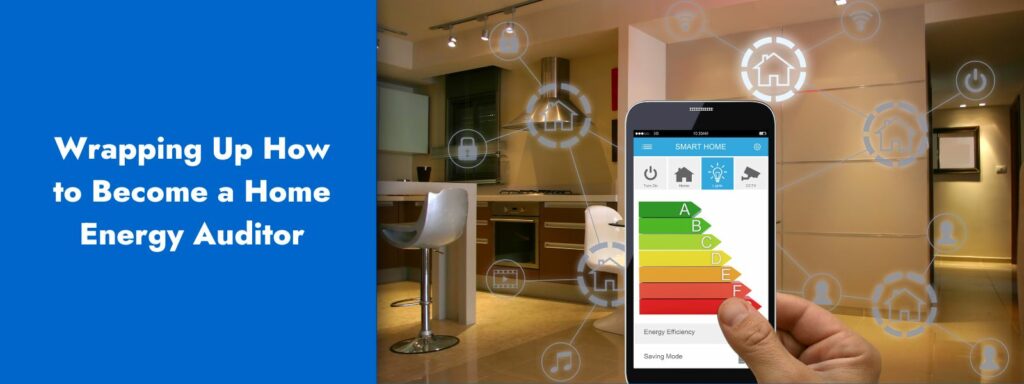
Wrapping Up How to Become a Certified Professional Home Energy Auditor
It’s a big accomplishment to complete your energy auditor certification! Now that you know what a home energy auditor is, why you should get certified, the benefits of being a certified home energy auditor, and how it can help your home inspection business, you’re all ready to begin your own journey.
You can streamline your energy audit inspection process with the best home inspection software available, from EZ HIS. Feel free to contact us with any questions or give our software a try with our FREE Trial! It’s a great way to help you through it and to help your home inspection business grow along with your new skills.

